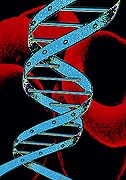2 New Genes Tied to 3 Cancers
Finding could improve early detection of breast, thyroid and kidney diseases, researchers say
|
E-mail this article
Subscribe to news
Printer friendly version
|

(SOURCE: Cleveland Clinic, news release, Aug. 7, 2008)
THURSDAY, Aug. 7 (HealthDay News) -- Two genes linked to breast, thyroid and kidney cancer have been identified by Cleveland Clinic researchers. The discovery of the genes SDHB and SDHD could help improve early detection of these cancers and boost patients' chances of survival.
In addition, the researchers said their finding could improve screening and treatment of patients with Cowden Syndrome (CS) and CS-like disease, which are difficult-to-recognize conditions that lead to a high risk of developing breast, thyroid and other cancers.
Normally, a gene called PTEN acts to suppress cancers. Mutations in PTEN determine susceptibility to CS, but some people with normal PTEN still develop CS, according to background information in a clinic news release.
The reseaqrchers identified SDHB and SDHD as markers of CS susceptibility in people with normal PTEN. In fact, mutations in these genes confer a higher risk of breast, thyroid and kidney cancers than PTEN mutations for individuals with dysfunctional PTEN, the researchers said.
"Clinicians should consider SDH testing for patients who have a strong personal history and/or family history of breast, thyroid and/or kidney cancers especially when their PTEN is normal. Patients with SDH mutations should be more rigorously screened for these cancers," lead researcher Dr. Chris Eng said in the news release.
Rigorous screening may reveal cancer at a earlier, more treatable stage.
The study is published in the Aug. 8 issue of The American Journal of Human Genetics.
More information
The U.S. National Cancer Institute has more about gene testing and cancer.
Copyright © 2008 ScoutNews, LLC. All rights reserved. 
HealthDayNews articles are derived from various sources and do not reflect federal policy. healthfinder.gov does not endorse opinions, products, or services that may appear in news stories. For more information on health topics in the news, visit the healthfinder.gov health library.